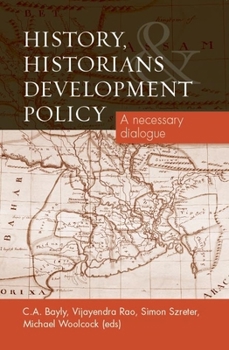History, Historians and Development Policy: A Necessary Dialogue
Select Format
Select Condition 
Book Overview
If history matters for understanding key development outcomes then surely historians should be active contributors to the debates informing these understandings. This volume integrates, for the first time, contributions from ten leading historians and seven policy advisors around the central development issues of social protection, public health, public education and natural resource management. How did certain ideas, and not others, gain traction in shaping particular policy responses? How did the content and effectiveness of these responses vary across different countries, and indeed within them? Achieving this is not merely a matter of seeking to 'know more' about specific times, places and issues, but recognising the distinctive ways in which historians rigorously assemble, analyse and interpret diverse forms of evidence.
This book will appeal to students and scholars in development studies, history, international relations, politics and geography as well as policy makers and those working for or studying NGOs. An electronic edition of this book is freely available under a Creative Commons (CC BY-NC-ND) licence.




